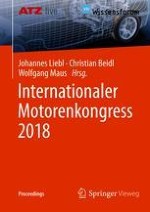2018 | OriginalPaper | Buchkapitel
Fueling clean transport to 2025+: update of JEC Well-To-Wheel (WTW) methodology for comparing alternative fuels and vehicle options to 2025+
verfasst von : Dorothee Lahaussois, Heather Hamje, Per Hanarp, Laura Lonza, Yugo Marta, Heiko Maas
Erschienen in: Internationaler Motorenkongress 2018
Verlag: Springer Fachmedien Wiesbaden
Aktivieren Sie unsere intelligente Suche, um passende Fachinhalte oder Patente zu finden.
Wählen Sie Textabschnitte aus um mit Künstlicher Intelligenz passenden Patente zu finden. powered by
Markieren Sie Textabschnitte, um KI-gestützt weitere passende Inhalte zu finden. powered by
Today in the EU, the transport sector is the second largest greenhouse gas (GHG) emitting sector after the power sector with 23% of total GHG emissions. Road transport accounts for the large majority of these emissions, reflecting the total amount of fuel consumed by the total EU fleet (measured by transport activity and fuel economy) multiplied by the GHG intensity of various transport fuels.According to the European Commission’s reference scenario (2016), the share of transport in total GHG emissions could continue to increase to reach 25% in 2030 becoming EU’s number one emitter with 32% in 2050 (SWD (2016)244). To tackle this anticipated trend, the European Commission published its European Strategy for Low- Emission Mobility (COM (2016) 501) in July 2016. The strategy highlights the most important transport policy measures for low-emission mobility based on three main pillars: moving towards low CO2 emission vehicles (decreasing Tank To Wheels GHG emissions); low emission alternative energy for transport (reducing Well to Tank GHG emissions), and improving the efficiency of the transport system. It is therefore necessary to look at a Well to Wheels approach when considering options to decarbonise the road transport sector.In 2003, JRC (the Joint Research Centre of the European Commission), EUCAR and CONCAWE, referred to as the JEC consortium, started their collaboration to produce an independent European Well to Wheels (WTW) analysis. The objective of the JEC WTW analysis is to have a common and transparent evaluation of energy use and GHG emissions for a wide range of current and forthcoming fuels and passenger car powertrain options reflecting European conditions. Forward looking and reflecting latest knowledge of industry and research experts, the JEC WTW analysis is considered as a European reference to quantify the decarbonisation potential of existing and future automotive fuels and powertrains. WTW JEC studies have been updated several times with the first version published in 2004 and the fully revised version 5 to be published in 2018. Updates reflect changes applicable to road transport. For example the emergence of biofuels as alternative transport fuels was addressed in versions 2 and 3 whilst the increased electrification of powertrain was included in version 4.
